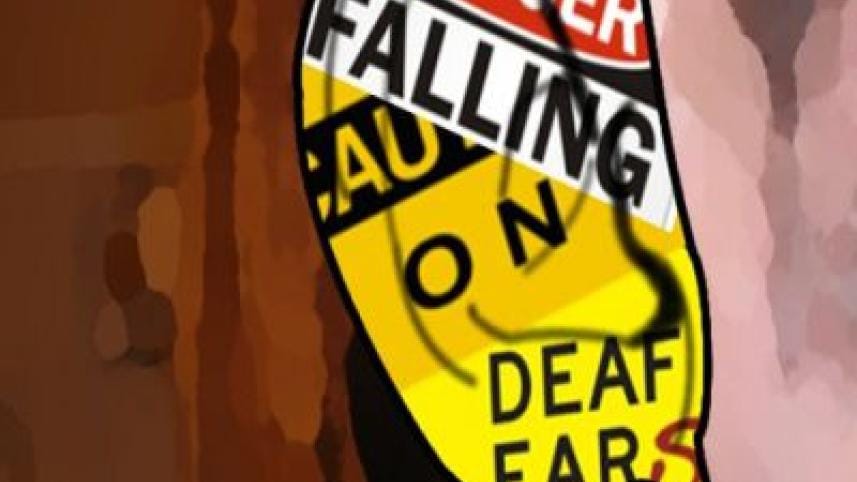A dialogue of the deaf?

THE civil society members have done the most civilised thing. They have made an appeal to the president, prime minister and the BNP chairperson for a dialogue to save this country. Signed by a former chief election commissioner, the well-meaning letter carried with it the sentiments of sensible people. Politicians should realise it's sheer stupidity to kill the rodents by burning the house.
But what kind of a dialogue are we talking about? Let us say both sides will agree to come to the table. What will they discuss? Who will moderate that discussion? What will be the agenda of that meeting? Will they debate the issues or kill time dozing off behind the closed doors?
This nation is suddenly overcome by this dialogue fetish. Everybody wants a dialogue between the two sides as if it's the silver bullet that will kill the beast. Dialogues in the past proved futile. A dialogue may not prove more useful in the future. Yet it's the only hope for a respite from our atrocious politics like ceasefire puts war on temporary hold.
China's founding father Mao Zedong once said that politics is war without bloodshed while war is politics with bloodshed. If we are to believe these words of wisdom, what do we call this terrible madness? People are burned alive, others beaten, hacked and shot to death. Bands of warriors roam the streets destroying property and vehicles, at times indistinguishable but for their banners and uniforms. If this is politics, why on Earth do we need war for bloodshed? The difference in our apocalyptic context is a matter of degree, not of kind.
In reality, politics and war have a thin line between them. Politics is smoldering war, and war is erupting politics. All wars come at the end of political failure, and politics is when wars are contained before explosion. Millions have died throughout history, because armed confrontation was precipitated by misguided politics.
Throughout history nations have erupted in violence in their struggle for existence. Some of them fought for freedom from foreign occupation, others wrestled with demons hiding inside their own population. Palestinians are fighting to recover their land from Israel. Syrians are drawn into a civil war over who should run the country. Americans engaged themselves in Afghanistan and Iraq under the pretense of eradicating terrorism. Libyans are killing each other from the teething pains of governance after Gaddafi.
Politics has made and unmade nations, latest example being the bifurcation of Sudan in 2011. The Soviet Union collapsed in 1991 giving birth to 15 independent republics. Wars have done the same thing. Two World Wars redrew the map of the world, nations born and banished in territorial shuffling while the British Empire was reduced to stump. A fledgling independent Kurdistan only looks imminent as the natural byproduct of war in Iraq.
Alternating between politics and war, nations behave like animals. Dogs heal their wounds by licking. Crocodiles secrete an enzyme that heals their wounds. But we also have the carpenter ants which in their defensive behaviour resort to self-destruction and explode themselves by violently contracting their abdominal muscles.
Where do we place ourselves in that range of instincts? Our leaders aren't surely modest enough to admit their mistakes and lick their wounds. The political process doesn't secrete an enzyme that can cure a crisis. That leaves us with the carpenter ants and their suicidal streak. By any standard and by all means, our politicians are destroying this nation in the name of building it.
So what will a dialogue achieve? The French have coined the phrase dialogue de sourds, which means "dialogue of the deaf" in English. It's a discussion in which each party is unresponsive to what the others say. If the politicians are not responsive to each other in the street, parliament, social gatherings and anywhere else, what is their chance of acting differently when sitting around a table?
In a truly democratic country, politics is supposed to be a dialogue unto itself. Leaders are meant to exchange views, agreeing to disagree and disagreeing to agree. And that is possible when they approach with an open mind motivated by the best interests of the country. That they aren't even amenable to the idea of sitting down to discuss that possibility indicates that we may not be ready yet to take our affairs in our hands.
In the middle of the 8th century, a king was democratically elected in Bengal and fourteen centuries later the inhabitants of this land are embroiled in a bitter power struggle. Politics has progressed through centuries but that pioneering process got reversed. Those, who auto-elect themselves to power, tend to become kings.
A dialogue will be successful only if our politicians bring their agreements to the table, leaving their differences at the door.
The writer is the Editor, First News and an opinion writer for The Daily Star.
Email: badrul151@yahoo.com

 For all latest news, follow The Daily Star's Google News channel.
For all latest news, follow The Daily Star's Google News channel.
Comments